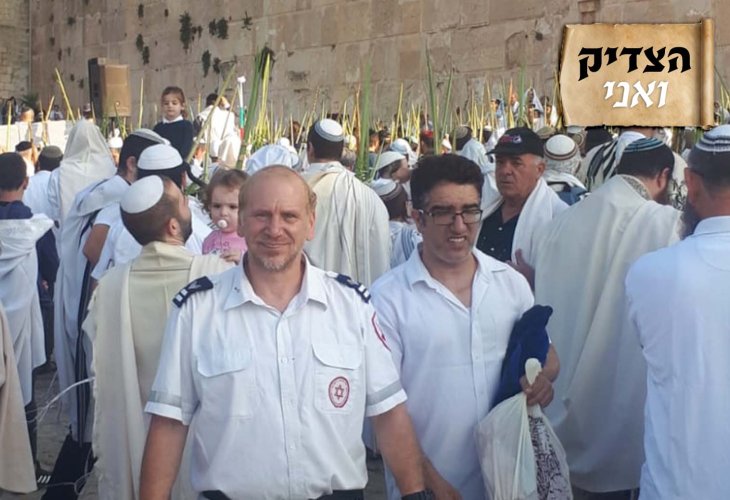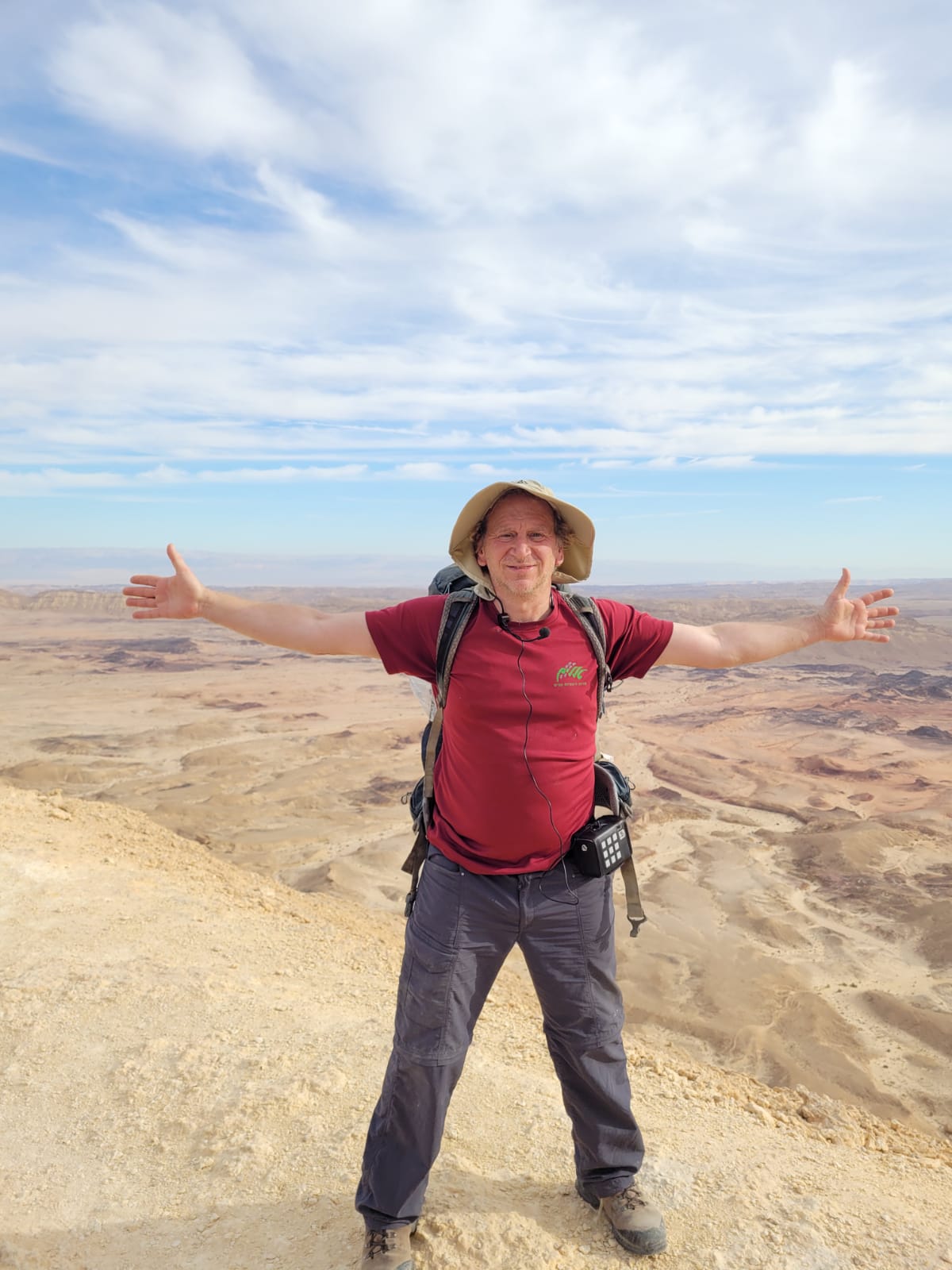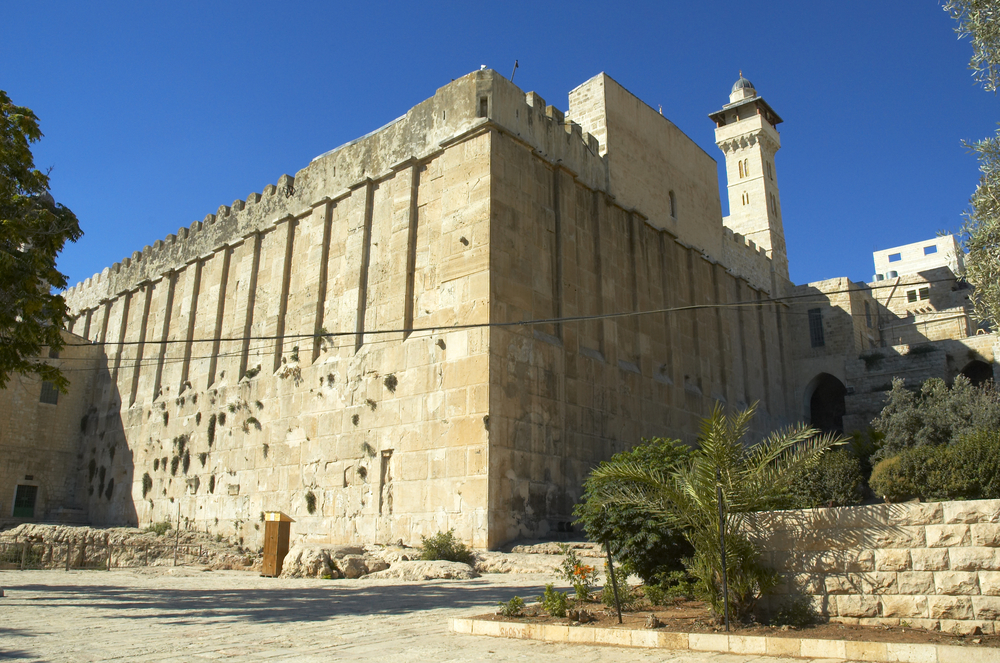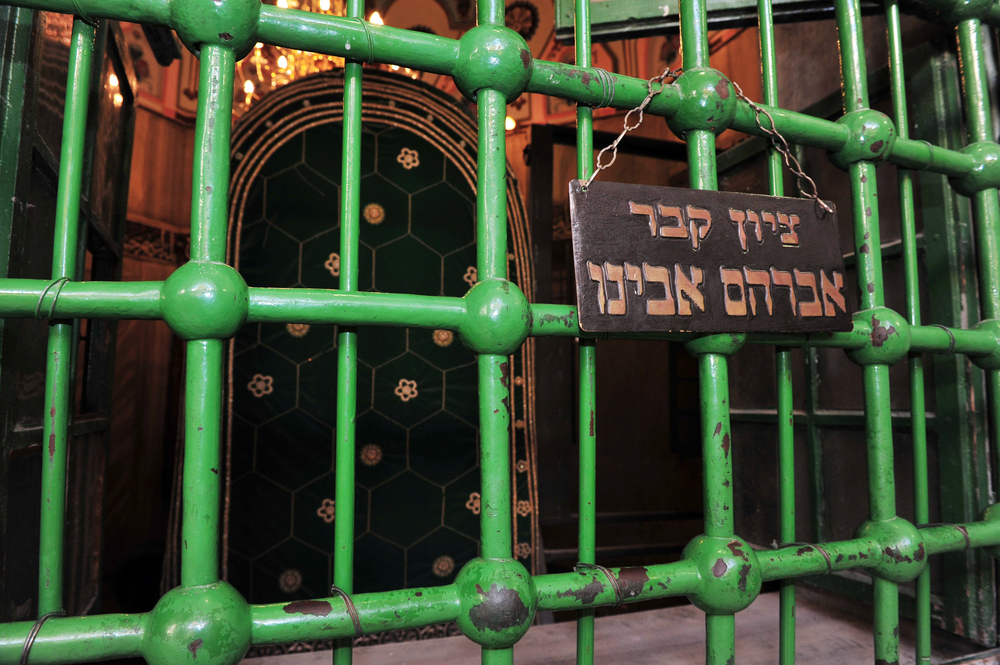"Write on My Gravestone: 'Here Lies the Collector of Tissues at the Cave of the Patriarchs'"
Chaim Neuman has lived in Hebron for decades, serving as a synagogue gabbai at the Cave of the Patriarchs, and believes: "The holy forefathers surely rejoice when they see the million people visiting them yearly." How is this connected to his kidney donation?
 Chaim Neuman
Chaim Neuman"I am a neighbor of Abraham Avinu - just a ten-minute walk from my home to the Cave of the Patriarchs." When Chaim Neuman reveals this, there's a great sense of satisfaction in his voice. "I believe that choosing to live in Hebron is the most correct and important decision I've made in my life," he adds sincerely.
Chaim's spiritual journey began in his youth, studying at the Yeshiva Shavei Hebron, where he developed a unique connection to this extraordinary city, especially to the Cave of the Patriarchs. "If we delve deeper," he continues, "one could say my roots are deeply connected to the cave, as my father fought in the Jerusalem brigade that liberated it during the Six-Day War. In our home, Hebron was often discussed, and we loved praying at the cave. My desire to live in this city crystallized during my yeshiva years. Later, I married my wife, a daughter of Hebron settlers. Her father was Rabbi Yair Uriel z"l, a founder of Kiryat Arba, and her mother was among the first to enter Beit Hadassah, a contested building between Muslims and Jews. She entered with other women and children, mainly to reclaim it for the Jews."
"My in-laws would often recount the harsh conditions they faced when they began residing in Hebron, yet it was clear to them that their decision to stay was irrevocable, simply because 'how could it be otherwise?'"
A Million Visitors a Year
When Neuman discusses the Cave of the Patriarchs, his excitement is palpable. "The fundamental and most essential events in Jewish history occurred right here. This site marks the first Jewish land purchase in Israel, when Abraham Avinu bought a burial plot for Sarah. King David reigned here, and it is here that our royal legacy was founded. Hebron is where the remarkable family known as 'the family of the Jewish people' began. Even by the numbers, one can see the site's significance for Jews, as in a normal year about a million visitors come to the Cave of the Patriarchs, making it one of Israel's most visited sites."
Professionally, Neuman works as a tour guide throughout Israel, which means that during the week, he does not always visit the Cave of the Patriarchs regularly, but Shabbat is his time. "I have the privilege to be the gabbai at the Cave of the Patriarchs on Shabbat," he shares. "Every Shabbat, I serve the forefathers and foremothers, and it truly feels like a tremendous honor. I once told my children that I want my gravestone to read: 'Here lies the one who collected tissues at the Cave of the Patriarchs.' And I mean it seriously. Because this is what I wish to ascend with after one hundred twenty years."

What does the position really require of you?
"First and foremost, there is an understanding that you are not merely in a synagogue, but in your grandparents' home. At grandparents' home, all the grandchildren come, different as they may be, perhaps even holding different viewpoints - all are welcomed with love. Once that understanding is achieved, everything seems entirely different.
"Throughout the entire Shabbat, countless different prayer services of varying styles take place in the cave, but the most unique service undoubtedly is on Friday night. It's a service unmatched by anything I've ever seen. So many 'grandchildren' of the grandparents attend. Before the prayer begins, I always announce: 'Tonight a wedding will take place here.' Those hearing me for the first time may be startled, thinking I refer to a real wedding, wondering how a wedding could happen on Friday night, but then I continue and explain that the wedding is between the Jewish people and Hashem. The Shabbat is our bride, and we come to dance and rejoice with her. After that, the Kabbalat Shabbat prayer begins, and it is amazing to see how young men from Lithuanian yeshivas in Bnei Brak dance alongside Chabadniks; soldiers in uniform dance with Chassidim wearing spodik; Sephardim with Ashkenazim; young and old, from Israel and abroad, from all walks of life – all praying together and dancing with immense joy, truly in unity. It is an indescribably moving experience."
Neuman notes that, in addition to the many guests who arrive each Shabbat at the Cave of the Patriarchs, there are also local residents, none of whom would consider attending any other synagogue. They too come in droves. "The Friday night prayer ends quite late because it is simply impossible to stop singing and dancing," he describes.
There are special occasions during the year when even more worshippers come to the site. For instance, on the eve of Rosh Hashanah, crowds gather for the recitation of Selichot. On Sukkot, there is a special day when masses visit the Cave of the Patriarchs. "Particularly well-known is Shabbat Chayei Sarah," he adds, "when about 30,000 worshippers visit the Cave of the Patriarchs annually. They rent apartments or stay with hosts, some set up tents, and all gather in the synagogue to hear the special Torah portion, which mentions the negotiation between Abraham Avinu and Ephron the Hittite. Abraham says to the Hittites: 'I am a stranger and sojourner among you; give me the possession of a burying place with you, and I shall bury my dead before me.' These words encapsulate our entire essence in our land – not mere sojourners, but inhabitants. We received the land by right, not grace.
"Moreover, Parashat Chayei Sarah is one of ten special days in the year when the Cave of the Patriarchs is open exclusively to Jews, including the Isaac Hall. Throughout the year, the Isaac Hall is closed to Jews. It is no wonder that so many come to visit during Shabbat Chayei Sarah. Before Shabbat, they erect the largest hospitality tent of its kind in the world. Throughout the Shabbat, there is an uplifting atmosphere, with dances and a spirit that cannot be described. You have to see it to believe it."
Grandparents Longing
What do you think is the secret of the Cave of the Patriarchs? How do so many people feel drawn to pray there?
"I believe that when you are in the Cave of the Patriarchs, you can genuinely feel the spirit of the forefathers and foremothers, as it is said – 'I have given Hebron to Caleb because he had a different spirit with him' – that different spirit is essentially the spirit of our forefathers and foremothers, and the understanding that our holy ancestors are the foundation for the existence of the Jewish people worldwide. It is something every Jew who steps here experiences."
 Cave of the Patriarchs (Photo: shutterstock)
Cave of the Patriarchs (Photo: shutterstock)What about the security aspect? Aren't people afraid to come?
"In addition to my various occupations, I also volunteer with Magen David Adom, so I've been called several times to incidents that occurred at the Cave of the Patriarchs. Usually, these events result in minor injuries, but they are certainly not pleasant. That being said, they are very rare, as overall, visiting the Cave of the Patriarchs is perfectly safe. You can arrive by bulletproof buses that take you right to the entrance. The cave itself is protected all day long, and generally, the entire settlement has a constant military presence, and above all, there is the protection of Hashem – 'He who keeps Israel shall neither slumber nor sleep.'
"It is also safe to walk around in the settlement itself, and you can even visit the special museum that was established here and tells the history of Hebron. I don't think there are many locations in the country where you can touch the walls and imagine the giants from the story of the spies, who stand there observing the spies who seem to them like grasshoppers. It's a tangible touch with history, living it anew."
What happened at the Cave of the Patriarchs during the COVID pandemic?
"During the COVID pandemic, people continued to come to pray here, but individually rather than in groups. We had to forego the grand Shabbat on Parashat Chayei Sarah, and as the gabbai, it was particularly difficult for me. In a certain sense, I felt the hardship of the forefathers too. As we all remember, during the pandemic, everyone spoke of grandparents being left isolated, and I felt as if there were elderly and loving grandparents in Hebron patiently waiting for their grandchildren who didn’t come. This year, thank God, we returned to normal with thousands returning. It was especially moving and joyous."
In closing, Neuman wishes to share a personal message: "Often people ask me about the special connection I found with Hebron, and I explain that I am simply connected to Abraham Avinu and the values he introduced to the world – the values of kindness and generosity. I was blessed to donate a kidney nearly five years ago, and when asked what prompted this choice and where the idea arose, I explained that first and foremost, it came from home, because I was raised in a home where my father always taught us that the greatest thing in the world is to do kindness for someone else.
 (Photo: shutterstock)
(Photo: shutterstock)"Beyond that, being specifically in the Cave of the Patriarchs, witnessing the incredible unity among all segments of the Jewish people, you truly feel that everyone is your sibling. I felt that it's not just a random act of donating a kidney to an anonymous person, but rather I am giving it to my brother, part of my extensive family. This feeling stemmed unequivocally from the spirit of the forefathers, and I hope to remain attached to this spirit always."

